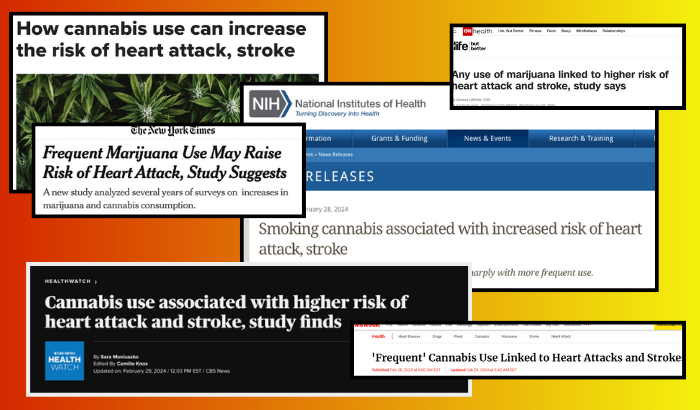
One of the biggest cannabis stories of 2024 so far is a media pseudo-event based on research that found “more frequent use … associated with higher odds of adverse cardiovascular outcomes.”
The press release hit the wire on the morning of Wednesday, Feb. 28: “Cannabis use linked to increase in heart attack and stroke risk.”
By that afternoon, it had spiraled into one of the biggest news hits about weed this year—all based on a study, published in the Journal of the American Heart Association and led by a data analyst from Massachusetts General Hospital in Boston, which found: “More frequent use of cannabis was associated with higher odds of adverse cardiovascular outcomes.”
You’d never know it from the screeching coverage, but the research has as many limitations as it may have implications. I picked through more than 50 iterations of the JAHA press release being passed off as news by outlets ranging from the New York Times to sleazy local five o’clock news desks, and I was unable to find a single example of a reporter seeking comment from a canna advocate or skeptical medical expert to lend larger context.
Instead, the underlying message of the articles I analyzed (and presumably of hundreds more carbon-copies) is simple and sensational: Marijuana is the new fentanyl! Or at least the new booze, which kills an estimated 140,000-plus people in the US every year by the way. Think I’m exaggerating? Here’s Bloomberg’s search headline: “Is Pot Actually Healthier Than Alcohol? New Data on Cannabis” (their actual header, once you click through, is even sexier: “Going ‘California Sober’ May Be Bad for Your Heart”).

Like any game of telephone, this story started out rather tame, then grew exponentially uglier in a short time. Some early headlines included: “‘Frequent’ Cannabis Use Linked to Heart Attacks and Strokes” (Newsweek); “Cannabis use associated with higher risk of heart attack and stroke, study finds” (CBS News); “Smoking cannabis linked to increased risk of heart attack, stroke” (The Hill). By the time it hit CNN and NBC News, the hook became that any pot use at all is likely to make your heart stop, with the latter shouting, “Marijuana use as little as once per month linked to higher risk of heart attack and stroke,” and the former going all-in: “Any use of marijuana linked to higher risk of heart attack and stroke, study says.”
The SEO sluts then pissed on the pile, ensuring that this study will get more burn than any number of far more important stories about cannabis—from the looming showdown over hemp-derived THC showing up on non-dispensary shelves, to industry pain points, to innumerable positives, like the advent of infused toothpicks, or even the federal government’s maddening wishy-washiness around drug scheduling. One shameless click machine chimed, “Cannabis linked to skyrocketing risk of heart attack, stroke for millions,” while a fart factory called Medical News Today went for table scraps, titling their piece to match the words that millions of Americans are likely searching as a result of this negative media deluge: “How cannabis use can increase the risk of heart attack, stroke.”
Indeed, at the time of this writing, “cannabis heart disease study” was a breakout trending query per Google Trends, while “Cardiovascular disease,” “Myocardial infarction,” and “Stroke” were all trending cannabis subtopics.
MedPage Today almost did the responsible thing, running the tempered headline, “Cannabis Singled Out for Cardiovascular Risk,” and citing a comparable study. But even they left the punchline for the very end, where most readers won’t see it: “[The researchers] acknowledged their reliance on self-reported cardiovascular conditions and cannabis use. Anonymous data also precluded linkage to mortality records for analysis. … Prospective cohort studies are needed to confirm their findings, they said.”
The New York Times hardly did better than the content farms. Their reporter noted, “The study is merely observational in its review of survey responses; it does not provide conclusive evidence that regular marijuana use causes heart disease.” But otherwise mostly just padded the JAHA language with sources who questioned the safety of weed in general. Their kicker: “People don’t know the data. … They think because it’s natural, it’s safe.”
There is no overstating the degree to which this is outrageous propaganda. The National Institutes of Health-funded study boasts using “data from nearly 435,000 American adults,” making it seem like that was the actual sample size intended for this research. But of course that’s not the case; rather, they “used 2016–2020 data from the Behavioral Risk Factor Surveillance Survey of the Centers for Disease Control and Prevention.” That “national cross-sectional survey, performed annually by the CDC, included 434,104 adults ages 18-74 from 27 U.S. states and two territories.”
Needless to say, that data set is sloppier than the government’s sustained war on the cannabis community; nearly 90% of adults in that survey reported not using cannabis at all, compared to Substance Abuse and Mental Health Services Administration data the CDC cites on its own site which shows: “Marijuana is the most commonly used federally illegal drug in the United States; 48.2 million people, or about 18% of Americans, used it at least once in 2019.”
Some people may wonder, What’s wrong with covering research about cannabis? To which I would respond there’s nothing wrong with it, as long as you cover a range of developments; notice that we barely see stories about studies on cannabis use and veterans, or weed helping people kick opioids, or the kinds of programs and research facilities, public and NGO alike, that prohibitionists call for in their empty rhetoric but never acknowledge. It’s the cherry picking that is gutless, as well as the breathless syndication. You can bet that everyone from politicians to community curmudgeons and conservative op-ed goons will reference this token study in assaults on every facet of cannabis for the next several years.
To be clear: this is a problem with our broken media, not the researchers from MGH—even though they seem to be making bold claims to the press that aren’t backed up by data, let alone this research, such as this remark from the lead author: “Cannabis smoke is not all that different from tobacco smoke, except for the psychoactive drug: THC vs. nicotine.”
Then again, the same head researcher also noted the much bigger, more important picture—even if the hacks recycling his press release don’t want to hear it. “Despite common use,” he said, “little is known about the risks of cannabis use and, in particular, the cardiovascular disease risks.”

























